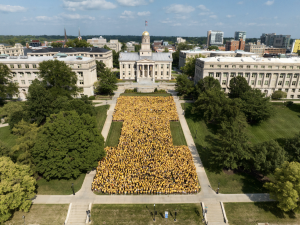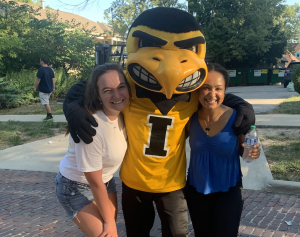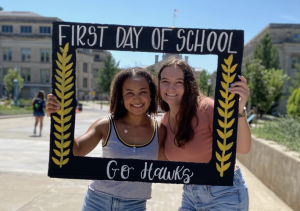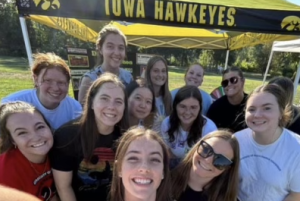Did you know that 1/3rd of Hawkeyes participate in research? You don’t have to be a scientist in a lab to be involved, but instead, research at the University of Iowa is diverse. Beyond the lab, research could include teaching culture, religion, politics, or law. Research can be observing the environment, analyzing natural disasters, or photographing people. Research can help children adjust to behavior issues. Research can be programming devices to aid the life of another person.
My involvement in research has ranged from completing the First-Gen Brain Research Workshop, working on the UI Pre-med Student Summer Research Internship, and getting started in the microbiology lab I work in now and picking up a fellowship. Keep reading to hear about my experience in all of these programs, about an average day in the lab, and how I got involved with the Office of Undergraduate Research!
The First-Gen Brain Research Workshop
On behalf of the Wessel Cognitive Neurology Lab, a select group of first-generation college students receive hands-on opportunities for insight into human brain research methods and the tasks of a research assistant in a human brain research Overse of 4 days, I got the opportunity to conduct and learn to read results from an electroencephalogram (EEG), functional magnetic resonance image (fMRI), and transcranial magnetic stimulation.
This experience was one I never had before. In these packed 4 days, I heard from undergraduate research assistants about their tasks, got a neuro-anatomy lesson, an understanding of how hospital-related research is conducted, taught how different examination methods are used to understand the human brain, and built a mentor/mentee relationship with the PI and head of this program. This program for me was great to dabble a bit in neurology, something I have never done before. However, even those who know quite a bit about neurology still benefit from this program’s ability to build connections with peers and develop an understanding of research overall.
UI Premed Student Summer Research Internship
The University of Iowa Carver College of Medicine (CCOM) sponsors premed undergraduate students to perform research and write a publication. Over 8 weeks, students will get paired with a faculty member to either analyze an existing dataset, be involved in obtaining and interpreting a health informatics data set, or write an up-to-date review article on a given topic of interest. During this time, students will contribute 40 hours a week to the project, earn a stipend, and have their publication costs covered.
During my experience as a UI Premed Student Summer Research Intern, I was matched with a remote project more, meaning I could go home for the summer or complete the internship relatively anywhere as long as I got my weekly hours in. I even remember putting some time in during my family vacation to the Smokey Mountains, so this internship can be very flexible. I worked on writing a review article on the immunology of oligodendrocytes, meaning I compiled the research findings of other publications on this topic into one simpler, easy-to-read article.
Undergraduate Research in a Microbiology Lab (Day in the Life!)
Since I was a sophomore, I have volunteered my time or earned course credit in the Jones Microbiology Lab putting in roughly ten hours a week. Our research focuses on the pathogenicity and adherence factors of Salmonella in the gut microbiome of chickens, and how relatedly this bacteria can be outcompeted in space by a less pathogenic E. coli strain. This work is important for chicken consumption further down the food chain by humans, as salmonellosis would be a less probable diagnosis.
In my daily life as a research assistant, I go to the lab about three times a week (more if I am passing strains) and I show up early! One thing my PI (principal investigator) taught me early in my time here is that experiments and lab chores take time, so if you want to see your results or get your sterilized materials back on the same day (or at least at a decent hour) you have to start in the morning.
When I show up to the lab, normally at 8 am, the first thing I do is any lab chores needed for the day. Often it is sterilizing equipment used the day before and restocking supplies such as pipet tips and broth culture tubes. The equipment used for this sterilization is always first come first served, so it pays off when I do this early in the morning since this process can take an hour or more.
Next up in my daily tasks is starting on an ongoing experiment. Often I am passaging strains (giving bacteria more fruitful media to grow in and storing past stains), or screening for mutations by completing adherence assays and plating the same culture on different media.
Normally in the middle of these tasks, my PI comes in for the day and gives me updates from our project collaborators or instructions on a new experiment. Recently I have been tasked with creating a lot of figures such as bar graphs for a paper we are hoping to publish or cartoon representations of some of our findings. I even got to use some of these graphs for my own poster!

The Office of Undergraduate Research (Fellowship) -and- Honors in the Major
During my senior year, I became an ICRU Fellow, now called an Office of Undergraduate Research Fellow. In this fellowship, I get to keep working in my microbiology lab, get course credit, and a stipend, and present at two poster sessions throughout the year. These poster presentations have been great practice for me as I also want to pursue Honors in the major of Microbiology. For this, I am writing a thesis on my work from the past few years and must defend it in a symposium with other microbiology majors. Fun fact, if you complete honors in the major, you automatically complete all your experiential learning credit for the university’s honors program if you are involved in that :) and this is exactly what I’m going for!
Ultimately, the University of Iowa has research opportunities and I have dove deeply into the sciences. I have had the wonderful opportunity to learn equipment I will use in my future career, techniques in the lab that I will use to understand other’s scientific papers, how to write my own paper to be published, and present my work in various forms. I hope if you wish to get involved in research here you find something just in your niche and challenge yourself along the wonderful opportunity of being able to research at the University of Iowa.
Continue Reading →







